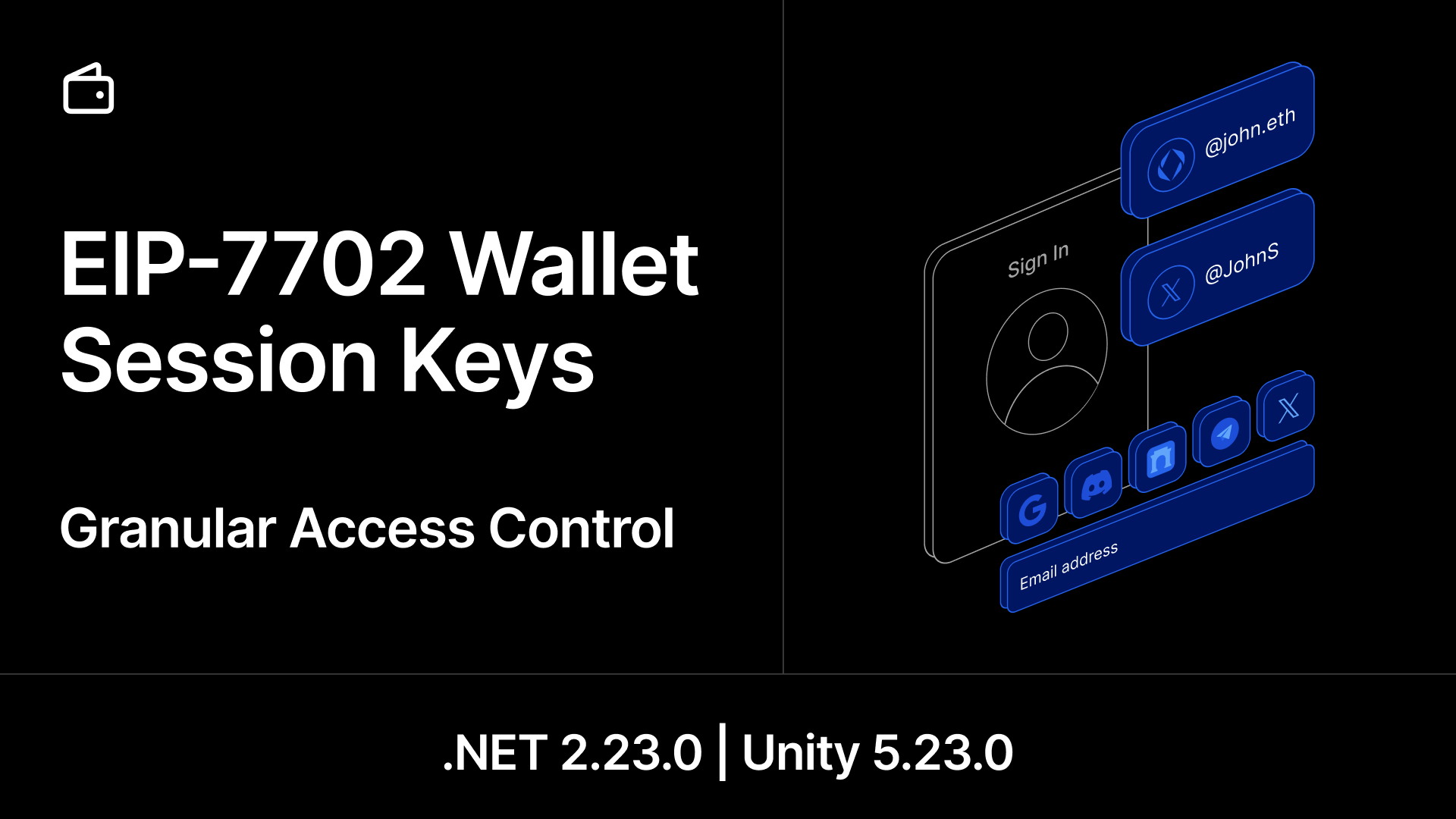.NET/Unity EIP-7702 Smart EOA Session Keys
.NET and Unity upgrades to the recently introduced EIP-7702 execution for In-App and Ecosystem Wallets!

Building on the EIP-7702 Account Abstraction and transaction sponsorship introduced in .NET v2.21.0 and Unity v5.21.0, this release extends Session Key functionality to EIP-7702 Smart EOAs. Session Keys enable granular permission delegation to external wallets for executing transactions on your behalf.
Key Features
- Permission Delegation: Grant time-limited access to external wallets
- Granular Controls: Define precise execution permissions per session
- Smart EOA Integration: Now available for EIP-7702-powered In-App Wallets, inspired by and improved from Smart Wallet session keys
- Backend Flexibility: Delegate transaction execution to external systems while maintaining control
Usage Example
Create session keys with either full permissions or custom policies:
// Grant full permissions for 24 hours
var sessionKeyReceipt = await smartEoa.CreateSessionKey(
chainId: chain,
signerAddress: await Utils.GetAddressFromENS(client, "vitalik.eth"),
durationInSeconds: 86400,
grantFullPermissions: true
);
// Grant custom permissions
var sessionKeyReceipt = await smartEoa.CreateSessionKey(
chainId: chain,
signerAddress: await Utils.GetAddressFromENS(client, "vitalik.eth"),
durationInSeconds: 86400,
grantFullPermissions: false,
callPolicies: new List<CallSpec>(), // Contract interaction rules
transferPolicies: new List<TransferSpec>() // Value transfer rules
);
Implementation Workflow
const int chain = 11155111; // 7702-compatible chain
// Initialize EIP-7702 wallet
var smartEoa = await InAppWallet.Create(
client,
authProvider: AuthProvider.Guest,
executionMode: ExecutionMode.EIP7702Sponsored
);
// Authenticate and upgrade EOA
if (!await smartEoa.IsConnected())
{
await smartEoa.LoginWithGuest(defaultSessionIdOverride: Guid.NewGuid().ToString());
}
// Execute upgrade transaction (optional)
var receipt = await smartEoa.Transfer(
chainId: chain,
toAddress: await Utils.GetAddressFromENS(client, "vitalik.eth"),
weiAmount: 0
);
// Verify account delegation (optional)
var isDelegated = await Utils.IsDelegatedAccount(client, chain, await smartEoa.GetAddress());
// Create session key
var sessionKeyReceipt = await smartEoa.CreateSessionKey(
chainId: chain,
signerAddress: await Utils.GetAddressFromENS(client, "vitalik.eth"),
durationInSeconds: 86400,
grantFullPermissions: true
);
Practical Applications
Once created, these session keys can be used to:
- Delegate transactions to backend services while maintaining security boundaries
- Enable temporary access for third-party services
- Create specialized roles with limited permissions
- Automate workflows without exposing primary wallet credentials
The session key mechanism opens up numerous possibilities for secure, permissioned delegation patterns while maintaining full control over your assets and contracts.

